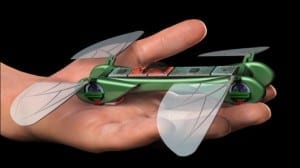
TechJect is looking to raise $110,000 via indigogo by the time the calendar ticks over to 2013.
Given their impressive flight capabilities, it’s not surprising to see researchers turning to the world of flying insects for inspiration when developing new kinds of micro UAVs. With their ability to both fly at high speeds and hover, the dragonfly would seem an obvious candidate forbiomimicry, but we hadn’t seen any attempts to model a micro UAV on the dragonfly’s four wing design – until now. A multi-disciplinary team from Georgia Tech has developed a robotic four-winged ornithopter called the TechJect Dragonfly that fits in the palm of a hand and combines the flight capabilities of a quadricopter, helicopter and fixed wing aircraft in one.
The TechJect Dragonfly is the culmination of four years of research and development at Georgia Tech, assisted by US$1 million in funding from the U.S. Air Force. TechJect is a spinoff out of Georgia Tech’s Robotics & Intelligent Machines (RIM) Department that was created to bring the Dragonfly and other robotic flyers to market. To that end, the TechJect team has turned to crowdfunding site indiegogo to help get the Dragonfly off the ground.
As well as borrowing its wing design from its biological namesake, the Dragonfly is also similar in size, measuring 15 cm (6 in) long. It weighs around 25 g (0.88 oz) and is powered by a 250 mAh lithium polymer battery that provides hover times of 8-10 minutes and a hybrid (hover/flight) time of 25 to 30 minutes.
Designed with a focus on modular customization, the Dragonfly carries up to 20 onboard sensors to suit a variety of applications, from aerial photography, gaming, research and development, civilian security and military reconnaissance. The modular approach results in the availability of various flight control packages.
Alpha model
The Alpha model, which can be secured with a US$99 pledge (provided the funding goal is met) but is estimated to retail at $250 or more, comes with a MARC-Basic flight computer, solenoidal actuators, and flight accessories including a remote controller, battery and charger.
via Gizmag – Darren Quick
The Latest Streaming News: Micro UAV updated minute-by-minute
Bookmark this page and come back often
Latest NEWS
Latest VIDEO








